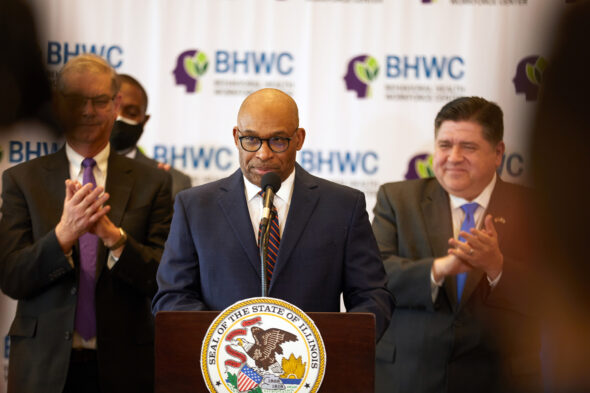College of Social Work helps lead Illinois’ new Behavioral Health Workforce Education Center

The new Behavioral Health Workforce Education Center will increase Illinois’ capacity to recruit, educate and retain behavioral health professionals, thanks in part to the UIC Jane Addams College of Social Work. The center builds upon the state’s commitment to behavioral health transformation, strengthening behavioral health care infrastructure and access across Illinois.
“From care portals and universal screenings to improved coordination of service delivery and increased statewide capacity, we are laying out a plan to build the best behavioral health system in the nation,” said Gov. JB Pritzker. “We’re launching the Behavioral Health Workforce Education Center, a partnership between the Illinois Board of Higher Education, Southern Illinois University’s School of Medicine, and the University of Illinois Chicago’s Jane Addams College of Social Work. It will begin with a $5 million annual investment from the Department of Human Services to help both rural and urban areas of our state address the behavioral health care crisis to increase access to effective services for all Illinoisans.”
The center will be housed at Southern Illinois University’s School of Medicine, with UIC’s College of Social Work, the Illinois Board of Higher Education and the Illinois Department of Human Services as core partners.
The UIC Jane Addams College of Social Work will serve as a secondary hub, supporting specific data collection and training initiatives.
“We’re excited to have this opportunity to understand the needs of the behavioral health workforce and support their training and career development,” said Sonya Leathers, UIC Jane Addams College of Social Work professor and co-director of the center. “We hope to increase access to effective services through initiatives that will provide critically needed support and training for behavioral health providers in a range of traditional and nontraditional settings.”
In Illinois and across the nation, behavioral health professionals are only able to provide a fraction of the services required to meet the population’s needs due to a national shortage of workers. The center was established to combat these critical shortages in the workforce by addressing barriers to recruitment and training, collecting data on behavioral health needs, increasing diversity in the workforce and expanding the capacity of health care providers to meet behavioral health needs.
The creation of the center is a milestone in a long-term plan to address the behavioral health workforce emergency. State lawmakers sounded an alarm about the staffing shortages in a unanimous 2018 resolution. In 2019, a Behavioral Health Workforce Education Center Task Force issued a final report recommending the creation of a hub-and-spoke center to address unmet mental and behavioral health needs.
Southern Illinois University School of Medicine will serve as the primary administrative hub in Springfield, providing coordination and support for building the behavioral health workforce pipeline and increasing entry into the field.
“We have been facing a workforce crisis in mental health for years due to a shortage of behavioral health specialists. Local staffing levels were already critical in rural and small urban communities, and the pandemic made matters worse globally, with a 25 percent increase in people seeking mental health care,” said Dr. Kari Wolf, chair of psychiatry at Southern Illinois University’s School of Medicine and CEO of the Behavioral Health Workforce Center. “Through the center, we aim to assess current educational pathways and create additional training opportunities to develop a diverse behavioral health workforce that is distributed across the entire state.”
Public and independent universities, as well as community colleges in 10 regions, will be invited to participate as partners to increase the statewide impact. All consortium members will coordinate programs and oversee initiatives to increase the behavioral health care workforce and its capacity to provide high-quality behavioral health services across the state.

